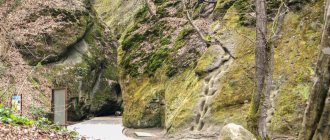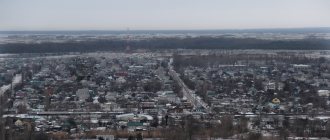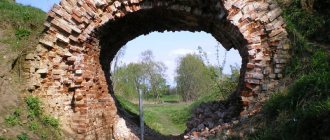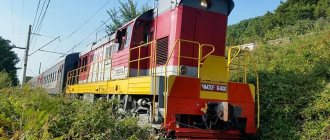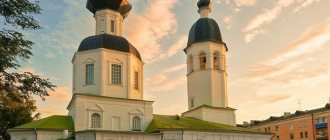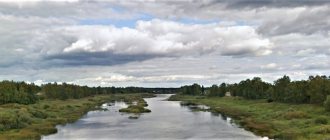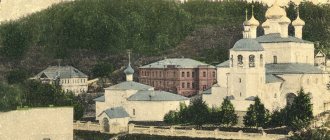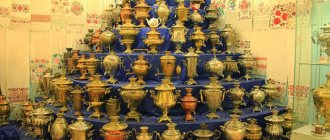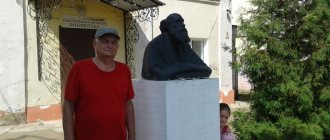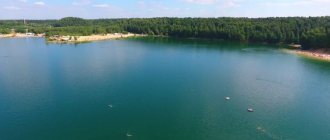Kalach, city, center of the district (1918-1924), Kalacheevsky district (since 1928). Since 1779 it was part of the Bogucharsky district.
It was founded at the confluence of the Podgornaya River into the Tolucheevka River as a settlement by military inhabitants who came from the Ostrogozhsky Regiment in 1716.
In the 1840s, a parish school was created. A post office has been operating since 1870, and a telegraph office since 1884. In 1896, the Talovaya - Kalach railway line opened (passenger traffic was discontinued in 1998).
In Kalach at the end of the 19th and beginning of the 20th centuries, a large grain fair was held annually in August. At the turn of the 19th - 20th centuries, a complex of buildings for the steam mills of the Bogatyrev brothers was built (partially preserved). In 1913, a girls' gymnasium was established, and 12 parish schools operated.
There were 4 churches in Kalach: Assumption (1750, preserved 1st tier), Voznesenskaya (1776, active), Resurrection (1818, preserved 1st tier occupied by a secondary school), Alexander Nevsky Cemetery (1887, architect S.L. Myslovsky , current).
Soviet power was established on December 16, 1917. In September 1918 - January 1919 and in June - September, October - November 1919, Kalach was occupied by the White Guards.
Had city status in 1918-1925. In 1922, there was a Kalach vicariate of the Voronezh diocese, headed by Bishop Seraphim (Adamov).
An agricultural technical school was created in 1930, and a construction technical school in 1946.
In December 1942, the headquarters of the Southwestern Front was located in Kalach (Lunacharsky Street, 6), and in the winter of 1942-1943 - the headquarters of the partisan movement of the Southwestern Front.
On January 10, 1945, by Decree of the Presidium of the Supreme Soviet of the RSFSR, it received city status.
The Pavlovsk-Volgograd highway passes through Kalach.
Population: about 2,200 (1,748), 12,928 (1859), 15,500 (1897), 23,200 (1989), 20,925 (2006), 19,516 (2014).
Nowadays in Kalach there are a sugar factory, a building materials factory, an auto repair plant, a cheese production plant, a meat processing plant, a food processing plant, 3 secondary schools, a gymnasium, a boarding school, a children's art school, a sports school, and a local history museum.
I.F. were born in Kalach. Vensovich, N.M. Dudetsky, M.P. Krasnolutsky, P.S. Krasnoshchekov, V.A. Pogrebnyakov, M.E. Tkachev, lived F.P. Zatsepilov, S.A. Mostovoy, I.E. Millet.
***
KALACH, city, center of Kalacheevsky district.
The founding date of Kalach is considered to be 1716. The place at the confluence of the Podgornaya and Tolucheevka rivers, where the city stands, is known from documents long before the settlement appeared here. According to data from 1571, there was a guard (travelling guard) at the headwaters of the Tolucheevka River near the Chalk Mountains. The chalk hill still exists in Kalach itself. Apparently, back in the 17th century, a big battle between Russians and Tatars took place here. The memory of him is preserved in legend. It reports the following: a gang of armed Tatars attacked the Russians at the confluence of the Tolucheevka and Podgornaya rivers. But the Russians entered into a fight with the nomads, surrounded them, drove them “into a corner” formed by the rivers, and drowned them there. This place was called Topilovka for a long time.
In 1716, Ukrainian Cossacks settled here. They laid the foundation for Kalach. According to data from 1724, it is known that Kalach at that time was a settlement with a church. In 1780, Kalach had 637 households, 4,028 inhabitants, 2 churches, many trading shops, 6 water mills.
Since 1928, Kalach has been the center of the Kalacheevsky district; in 1945 it was transformed into a city.
Kalach is the birthplace of Heroes of the Soviet Union N.M. Dudetsky and M.P. Krasnolutsky.
Poets, toponymists, and amateur local historians have thought about the name of the city. Some decorated poems with this word, others tried to somehow explain such an unusual name. Here are the lines from G. Lutkov’s poem “City of Kalach”:
Kalach! What a delicious name! Ruddy, fragrant name. The town woke up to a dewy early morning, the fog in the ravines was filled with sour cream. And the warm and pink sky breathes, You hear the steppe breathes. For ten, twenty, a hundred miles there is such a flood of Khlebov! And in the wind the Wave moves with a ringing sound, Well, straight ahead, neither pass nor pass.
He is also the author of “Song of Kalach” (music by V. Rudenko), which contains the following words:
The river is silver with a cheerful wave, And the leaf is hot from the June sun. You are in my heart and in song forever with me, my old love, the city of Kalach.
There is a song “Kalacheevsky Space” - words by V. Ostroverkhov, music by I. Nazarenko. There are many other poems where the name Kalach is played out in one way or another. Of course, the name of the city did not come from the round loaf of bread. And a lot of explanations were given to him. About two hundred years ago, two legends were recorded in Kalach. One of them explains the name this way: when the first settlers came to the Podgornaya River, they built around the swamp, placing houses in a circle, like a roll. Another legend said that to drain the swamp, the first settlers drove piles and “hammered in” stakes to strengthen the soil.
In literature, the Tatar exclamation “Kalach!” was cited, which means “be hungry!” (taken from the famous dictionary of Vladimir Ivanovich Dahl). But basing names on random exclamations is unconvincing. Attempts were made to reproduce it from the Turkic word “kala”, which means “fortress”. But in Kalach there are no signs of any fortress, and where would the letter “ch” at the end come from? The author of these lines tried to explain the name according to the following scheme: Tolucheevka, Talach, Kalach (V. Prokhorov, “Where did the name come from,” “Rise” No. 1 for 1961), based on the fact that many river names became the names of settlements. But here the explanation of the name is based on an accident that requires documentary confirmation. According to documents, it is known that in 1724 Kalach was called the same as it is now. The most convincing explanation for the name given by V.A. Nikonov in the book “A Brief Toponymic Dictionary” (1966), where it is said that “kalach” in Russian dialects means a sharp bend in the river. The name of the city came from such a bend on the Tolucheevka River or from some floodplain lake of bizarre shape.
In Kalach, together with its suburbs, there are more than 30 thousand residents (data from 1973 - note from the site authors). Industrial enterprises include a flour mill, a meat processing plant, a mechanical plant, and a building materials plant. There are 2 cinemas and several clubs in the city. More than 4 thousand children study in secondary schools (in 1906 there were only 849 students). The regional newspaper “Leninsky Put” is published. Nowadays Kalach is a cozy, clean city with asphalt streets. It has a lot of greenery.
Park "Defenders of the Fatherland"
At the entrance to Kalach from Vorobyovka there is a birch grove. Residents of neighboring streets have long proposed creating a park here, since there was simply no place for recreation with children in this microdistrict. The grove turned into a dump and collection point for the marginalized. In addition, almost a third of the trees have dried up, creating a serious fire danger.
The organization of army and navy veterans put forward an initiative to develop a “Defenders of the Fatherland” park here: nearby there are monuments to internationalist soldiers and the border guard hero Yevgeny Rodionov. The city authorities responded to the proposal of the Kalacheev residents. The park is very necessary here and would serve as a logical conclusion to the project of improvement and creation of a pedestrian zone on Sovetskaya Street, which was previously implemented under the “Comfortable Urban Environment” program.
Climate
The city's climate is temperate continental, with relatively cold winters and hot, dry summers.
| Climate of Kalach (normal 1981–2010) | |||||||||||||
| Index | Jan. | Feb. | March | Apr. | May | June | July | Aug. | Sep. | Oct. | Nov. | Dec. | Year |
| Average temperature, °C | −6,1 | −6,5 | −1 | 8,4 | 15,1 | 19,3 | 21,2 | 19,9 | 13,7 | 7,2 | −0,2 | −4,9 | 7,2 |
| Precipitation rate | 42 | 33 | 29 | 24 | 37 | 57 | 57 | 35 | 50 | 40 | 43 | 42 | 489 |
| Source: [meteo.ru/it/178-aisori FSBI “VNIIGMI-MTsD”] | |||||||||||||
Excerpt characterizing Kalach (city)
“I spoke and spoke in the Assembly of Nobles,” interrupted Prince Vasily, “but they did not listen to me.” I said that the sovereign would not like his election as commander of the militia. They didn't listen to me. “Everyone is some kind of mania for confrontation,” he continued. - And in front of whom? And all because we want to ape the stupid Moscow delights,” said Prince Vasily, confused for a moment and forgetting that Helen should have made fun of the Moscow delights, and Anna Pavlovna should have admired them. But he immediately recovered. - Well, is it proper for Count Kutuzov, the oldest general in Russia, to sit in the chamber, et il en restera pour sa peine! [his troubles will be in vain!] Is it possible to appoint as commander-in-chief a man who cannot sit on horseback, falls asleep in council, a man of the worst morals! He proved himself well in Bucarest! I'm not even talking about his qualities as a general, but is it really possible at such a moment to appoint a decrepit and blind man, simply blind? A blind general will be good! He doesn't see anything. Playing blind man's buff... he sees absolutely nothing! Nobody objected to this. On July 24th this was absolutely true. But on July 29, Kutuzov was granted princely dignity. Princely dignity could also mean that they wanted to get rid of him - and therefore Prince Vasily’s judgment continued to be fair, although he was in no hurry to express it now. But on August 8, a committee was assembled from General Field Marshal Saltykov, Arakcheev, Vyazmitinov, Lopukhin and Kochubey to discuss the affairs of the war. The committee decided that the failures were due to differences in command, and, despite the fact that the people who made up the committee knew the sovereign’s dislike for Kutuzov, the committee, after a short meeting, proposed appointing Kutuzov as commander-in-chief. And on the same day, Kutuzov was appointed plenipotentiary commander-in-chief of the armies and the entire region occupied by the troops. On August 9, Prince Vasily met again at Anna Pavlovna’s with l’homme de beaucoup de merite [a man of great merit]. L'homme de beaucoup de merite courted Anna Pavlovna on the occasion of her desire to be appointed trustee of the female educational institution of Empress Maria Feodorovna. Prince Vasily entered the room with the air of a happy winner, a man who had achieved the goal of his desires. - Eh bien, vous savez la grande nouvelle? Le prince Koutouzoff est marechal. [Well, do you know the great news? Kutuzov - Field Marshal.] All disagreements are over. I'm so happy, so glad! - said Prince Vasily. “Enfin voila un homme, [Finally, this is a man.],” he said, looking significantly and sternly at everyone in the living room. L'homme de beaucoup de merite, despite his desire to get a place, could not resist reminding Prince Vasily of his previous judgment. (This was discourteous both in front of Prince Vasily in Anna Pavlovna's living room, and in front of Anna Pavlovna, who just as joyfully accepted this news; but he could not resist.) - Mais on dit qu'il est aveugle, mon prince? [But they say he is blind?] - he said, reminding Prince Vasily of his own words. “Allez donc, il y voit assez, [Eh, nonsense, he sees enough, believe me.],” said Prince Vasily in his bass, quick voice with a cough, that voice and cough with which he resolved all difficulties. “Allez, il y voit assez,” he repeated. “And what I am glad about,” he continued, “is that the sovereign gave him complete power over all the armies, over the entire region - power that no commander-in-chief has ever had.” This is a different autocrat,” he concluded with a triumphant smile. “God willing, God willing,” said Anna Pavlovna. L'homme de beaucoup de merite, still a newcomer to court society, wanting to flatter Anna Pavlovna, shielding her previous opinion from this judgment, said. - They say that the sovereign reluctantly transferred this power to Kutuzov. On dit qu'il rougit comme une demoiselle a laquelle on lirait Joconde, en lui disant: "Le souverain et la patrie vous decernent cet honneur." [They say that he blushed like a young lady to whom the La Gioconde would be read, while he said to him: “The sovereign and the fatherland reward you with this honor.”] - Peut etre que la c?ur n'etait pas de la partie, [ Maybe the heart was not fully involved,” said Anna Pavlovna. “Oh no, no,” Prince Vasily interceded warmly. Now he could no longer give up Kutuzov to anyone. According to Prince Vasily, not only was Kutuzov himself good, but everyone adored him. “No, this cannot be, because the sovereign knew how to value him so much before,” he said. “God only grant that Prince Kutuzov,” said Anpa Pavlovna, “takes real power and does not allow anyone to put a spoke in his wheels - des batons dans les roues.” Prince Vasily immediately realized who this nobody was. He said in a whisper: “I know for sure that Kutuzov, as an indispensable condition, ordered that the heir to the crown prince not be with the army: Vous savez ce qu'il a dit a l'Empereur?” [Do you know what he said to the sovereign?] - And Prince Vasily repeated the words that Kutuzov allegedly said to the sovereign: “I cannot punish him if he does something bad, and reward him if he does something good.” ABOUT! this is the smartest man, Prince Kutuzov, et quel caractere. Oh je le connais de longue date. [and what a character. Oh, I’ve known him for a long time.] “They even say,” said l’homme de beaucoup de merite, who did not yet have court tact, “that His Serene Highness made it an indispensable condition that the sovereign himself should not come to the army.” As soon as he said this, in an instant Prince Vasily and Anna Pavlovna turned away from him and sadly, with a sigh about his naivety, looked at each other. While this was happening in St. Petersburg, the French had already passed Smolensk and were moving closer and closer to Moscow. The historian of Napoleon Thiers, just like other historians of Napoleon, says, trying to justify his hero, that Napoleon was drawn to the walls of Moscow involuntarily. He is right, as are all historians who seek an explanation of historical events in the will of one person; he is just as right as Russian historians who claim that Napoleon was attracted to Moscow by the art of Russian commanders. Here, in addition to the law of retrospectivity (recurrence), which represents everything that has passed as preparation for an accomplished fact, there is also reciprocity, which confuses the whole matter. A good player who has lost at chess is sincerely convinced that his loss was due to his mistake, and he looks for this mistake at the beginning of his game, but forgets that in every step of his, throughout the entire game, there were the same mistakes that none his move was not perfect. The error to which he draws attention is noticeable to him only because the enemy took advantage of it. How much more complex than this is the game of war, taking place in certain conditions of time, and where it is not one will that guides lifeless machines, but where everything stems from countless collisions of various arbitrarinesses?
Links[edit]
Notes[edit]
- ^ abcdefgh Law No. 87-OZ
- ^ abc "Citizen Kalach". Administration of the urban settlement of Kalach. Retrieved January 2, 2022.
- ^ a b Federal State Statistics Service (2011). “All-Russian Population Census 2010. Volume 1" [All-Russian Population Census 2010, vol. 1]. All-Russian Population Census 2010 [All-Russian Population Census 2010]
. Federal State Statistics Service. - "26. The size of the permanent population of the Russian Federation by municipalities as of January 1, 2022". Federal State Statistics Service. Retrieved January 23, 2022.
- ^ abcde Law No. 63-OZ
- "On the Calculation of Time". Official Internet portal of legal information
. June 3, 2011. Retrieved January 19, 2022. - Post office. Information and computing center of OASU RPO. ( Post office
).
Search for postal service objects ( postal Search for objects
) (in Russian) - ↑
Federal State Statistics Service of Russia (May 21, 2004).
“The population of Russia, the constituent entities of the Russian Federation as part of federal districts, urban settlements, settlements, settlements of 3 thousand or more people” [Population of Russia, its federal districts, federal districts, districts, urban settlements, rural settlements - administrative centers and rural settlements with a population of more than 3,000 people] (XLS). All-Russian Population Census 2002
. - “All-Union Population Census of 1989. The current population of union and autonomous republics, autonomous regions and districts, territories, negative phenomena, urban settlements and rural district centers” [All-Union Population Census of 1989: current population of union and autonomous republics, Autonomous regions and districts , territories, regions, districts, towns and villages performing the functions of district administrative centers. All-Union Population Census of 1989 [All-Union Population Census of 1989]
.
Institute of Demography of the National Research University: Higher School of Economics [Institute of Demography of the National Research University: Higher School of Economics]. 1989 - via Demoscope Weekly
.
Kalachevsky Museum of Local Lore
Historians and scientists are still arguing about how and when the first settlement and cultivation of these places took place. Recently, a large number of archaeological finds and historical documents have been collected, many of which the Ministry of Culture has placed at the disposal of the city museum, which has been operating since 1980.
The museum is divided into 4 structural divisions:
- An archaeological hall in which finds and results of excavations are exhibited. From them we can assume what and how happened on the territory of modern Kalach many thousands of years ago, what kind of people lived there, what animals lived there, and what approximately climatic conditions existed at that time. All these conclusions are drawn from the so-called fossils;
- Ethnographic Hall, which is dedicated to the life and everyday life of peasants of the 18th-19th centuries;
- The Hall of Military Glory, which contains documents, letters, weapons and household items related to the Great Patriotic War of 1941-1945, the First World War, as well as some finds from the Napoleonic War of 1812;
- And the last room is the department of modern history. Here the visitor can find information about the events taking place in the last 100 years, about the revolution and perestroika.
Location: Lenin Square - 10.
